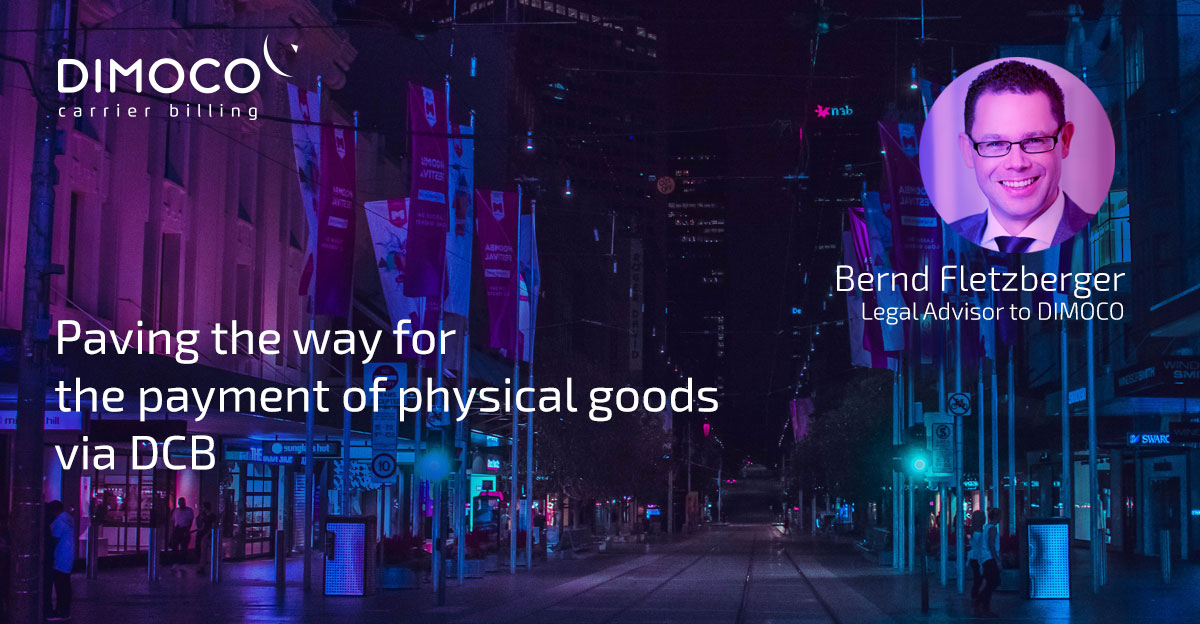Guest blog Bernd Fletzberger: Enabling EU carriers to charge physical goods under PSD2
How it is possible for carriers to settle a payment transaction of physical goods via direct carrier billing?
How can merchants, for example vending machine providers across Europe, settle a payment transaction of physical goods via direct carrier billing (DCB), enabling customers to pay snacks or beverages conveniently and quickly with their mobile phones?
As we all know, the settlement of all kind of payment transactions by carriers is subject to the EU’s revised Payment Services Directive PSD2. That part of European payment law, and its implementations in the member states, determines which kind of transactions carriers may conduct without needing a license as a payment service provider.
Carriers may settle the payment of digital goods, voice based services, e-tickets and certain charitable services, provided the amount of the payment does not exceed certain thresholds. These thresholds are € 50 for each transaction and € 300 for all transactions provided on behalf of one customer per month.
Carriers are though not allowed to settle payments for physical goods without obtaining a respective license as a payment service provider.
Although the commission aims at fostering innovative payments, obtaining a respective license is a quite burdensome procedure. Furthermore, maintaining such a license requires commitment and considerable resources in order to fulfil all regulatory requirements. Consequently, this option is not a feasible way forward for most carriers and therefore it is not very surprising that most carriers decide against applying for such a license.
The solution “Agent Model”
In connection with the payment of physical goods, however, there is another possibility, which has not been put to real life for the time being. The so-called “Agent Model”. Basically, the “Agent Model” means that a carrier acts as a payment agent of a duly licensed payment service provider.
Advantages of an “Agent Model”
- The carrier remains in the payment flow, meaning he receives the funds first from his customer and forwards them to an aggregator or merchant. Further, the carrier can maintain obtaining certain diagnose for providing such services.
- The carrier may maintain his well-established processes regarding DCB for digital goods.
- The carrier, if acting as an agent, does not require a separate license as a payment service provider.
The downsides of the model?
Well, frankly speaking, we do not see major complications.
However, there are some requirements that have to be taken into consideration when implementing such a model, such as:
- A carrier will, of course, need a duly authorized and reliable partner, a respective payment service provider. DIMOCO Carrier Billing is such a partner as they are a duly licensed payment institute seated in Austria, supervised by the Austrian Financial Market Authority and has passported this license to all member states of the European Union and European Economic Area. They are authorized to provide their payment services via agents all across the entire EEA area.
- One needs to conclude an agent contract respectively a cooperation agreement with such a payment institute, which deals with all the rights and duties in connection with the provision of such services.
- The payment service provider needs to notify the carrier as an agent to its competent financial market authority. If the carrier is seated in another EU member state as the payment institute, the notification involves communication by the home member state authority with the respective host authority.
- The managing directors of the agent need to be deemed as “fit and proper”. This means that they have to be reliable person with a stable economic situation on the one hand, and with a respective professional background on the other hand. In regards to the professional suitability, one can assume that experience in handing DCB in regards to digital goods will be sufficient to prove that the persons are also suitable to provide almost identical services for physical goods.
After respective notification, the competent authority will assess the notification. If all requirements are fulfilled, the authority has to add the agent to the so-called payment services register. Only if the agent is entered into that register, the DCB of physical goods via the carrier can commence. According to PSD2, the authorities have three months to finalize such a procedure and registration.
To conclude, I want to give a brief overview where we stand with implementing such an agent model:
For the time being and to the best of my knowledge, there is not yet a carrier in the EU acting already as agent of a payment service provider in that context.
On behalf of DIMCOCO, we have already started a notification with the Austrian Financial Market Authority with a carrier seated in Germany. We expect that this pilot project with target vending machines will be finalized within the upcoming months. We are very optimistic that soon the first vending machine providers will offer their customers to pay for snacks and beverages via mobile phone and carrier billing.

Bernd Fletzberger is an expert in payment and financial market law. Among others, he advises credit, payment and e-money institutions, insurers, carriers, and other technology providers as well as Fintech startups on regulatory issues. During his entire professional career, he has dealt with banking, payment, insurance and capital markets law. He regularly gives lectures on banking, payment and anti-money laundering issues. He is also editorial board member of Austrian Financial market law journal ZFR. He regularly publishes on financial market law, in particular, payment law issues.
Since 2010, Bernd Fletzberger is a partner of the Viennese corporate law firm PFR, specialized law firm focusing on Fintech, payments, banking, and other financial market issues and acts as a legal advisor to DIMOCO.

